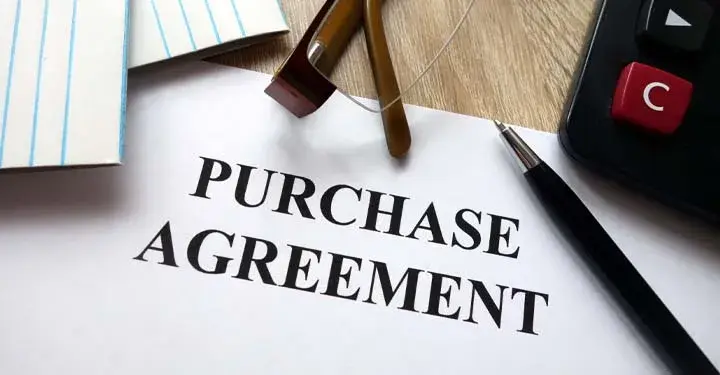
Especially when it comes to large or complex transactions, using a purchase agreement can be the best way to handle the sale and purchase of goods. Find out what this legal document should contain and when you should use it.
Find out more about business management


by Edward A. Haman, Esq.
Edward A. Haman is a freelance writer, who is the author of numerous self-help legal books. He has practiced law in H.
Updated on: November 30, 2023 · 4 min read
If you or your company will be buying or selling goods, you will want to have some type of documentation of the transaction. Especially for more complex transactions, you may need to use a purchase agreement, which is a legal contract that sets forth the terms of the sale and purchase of goods.

Generally, a purchase agreement is used for large purchases of goods when there is some degree of complexity to the transaction. The complexity can relate to various aspects, such as delivery of the goods or terms of payment. A purchase agreement is signed by both the seller and buyer before the goods are delivered and before any payment is made. Once it is signed by both parties, it becomes a binding contract. Although not the same as a purchase order, which is simply an offer to purchase goods, a purchase agreement may also be called by other names, such as sales contract, purchase contract, or purchase and sale agreement.
In terms of a purchase agreement, the term “goods" applies to various types of tangible assets and does not apply to services. Real estate transactions may also use a purchase agreement, but real estate is a separate category of property from goods.
Simpler transactions can use less complicated documents, such as a receipt or a bill of sale, which are typically given in conjunction with the transfer of the goods and the payment. For example, if your company buys one computer, a simple receipt may be sufficient. Or, if you are buying a car that must be registered with your state government, a bill of sale might be used. However, if your company is purchasing numerous computers or a fleet of trucks and the goods will be delivered and paid for over a period of time, a purchase agreement is more appropriate.
Either the seller or the buyer can prepare a purchase agreement. Like any contract, it can be a standard document that one party uses in the normal course of business or it can be the end result of back-and-forth negotiations. If additional terms are negotiated that are not included in the standard agreement, these can be stated in a purchase agreement addendum.
In addition to creating an agreement that fully covers all aspects of the sale, it is important that the agreement be signed by the individuals who have the legal authority to bind the parties to the contract. If you or the other party is an individual person or a person operating a business as a sole proprietorship, that person should sign the agreement. For another type of business entity, the agreement should be signed by an officer or director of a corporation, a manager or member of an LLC, or one of the partners in a partnership.
Any purchase agreement should include at least the following information:
It is also common for a purchase agreement to include other details, such as:
Being sure that the agreement fully sets forth the responsibilities of the other party can be of vital importance in the event you decide you want to get out of a purchase agreement, which can usually only be done if there is a breach of contract by the other party.
A purchase agreement reflects the nature of the goods and the industry involved. For example, a wholesale purchase agreement for steel contains different terminology from a commercial purchase agreement for a large number of computers and printers.
An online search for “purchase agreement template" or “purchase agreement form" will reveal numerous websites with forms for many situations. For example, when two businesses plan to engage in a continuing relationship, they often use a special type of contract called a product supply agreement. If you will be selling goods to a federal government agency, special contracting regulations come into play that dictate what needs to be included in a purchase agreement. These regulations may vary depending upon the agency and type of goods involved.
For relatively complex transactions, it is good business practice to use a comprehensive purchase agreement. A well-crafted document can help assure that both parties understand what is expected so as to avoid potentially costly misunderstandings.
Find out more about Business ManagementThis article is for informational purposes. This content is not legal advice, it is the expression of the author and has not been evaluated by LegalZoom for accuracy or changes in the law.
You may also like
When buying goods for your company, should you use a purchase order or a purchase agreement? To determine this, you need to understand the differences between these two commercial purchasing documents.
February 2, 2024 · 4min read
Considering an LLC for your business? The application process isn't complicated, but to apply for an LLC, you'll have to do some homework first.
September 11, 2024 · 11min read
2024 is one of the best years ever to start an LLC, and you can create yours in only a few steps.
July 29, 2024 · 22min read